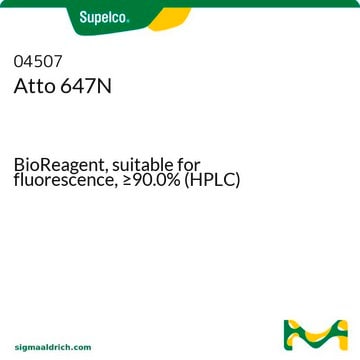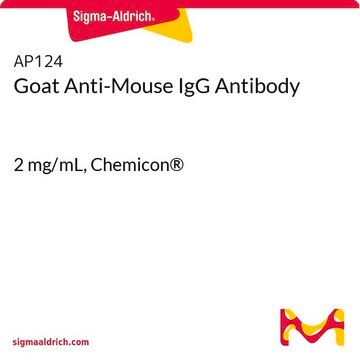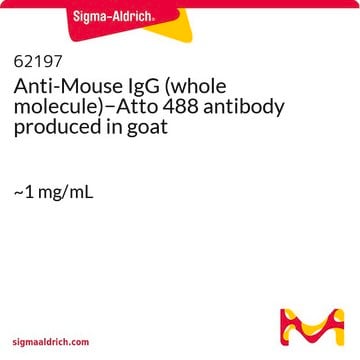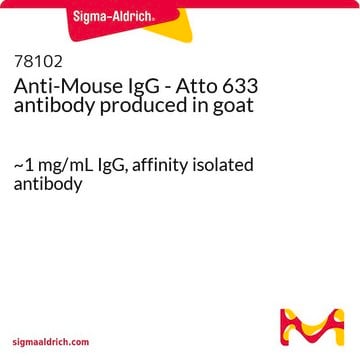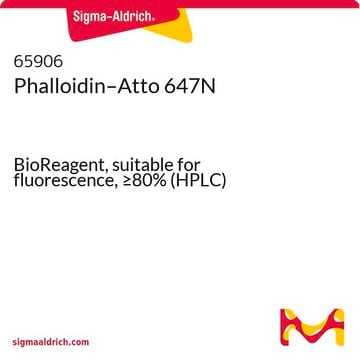43394
Anti-Mouse IgG−Atto 550 antibody produced in goat
1 mg/mL protein
Synonym(s):
Atto 550-Anti-Mouse-IgG antibody produced in goat
Sign Into View Organizational & Contract Pricing
All Photos(1)
About This Item
Recommended Products
conjugate
Atto 550 conjugate
Quality Level
antibody product type
secondary antibodies
clone
polyclonal
form
liquid
contains
50% glycerol as stabilizer
species reactivity
mouse
concentration
1 mg/mL protein
technique(s)
immunofluorescence: suitable
protein array: 2.8 μg/mL
fluorescence
λex 550 nm; λem 576 nm in PBS
storage temp.
−20°C
target post-translational modification
unmodified
Physical form
Atto 550 goat anti-mouse IgG (whole molecule) is provided in unit sizes of 1 ml as 1 mg/ml solutions in 0.1 M sodium phosphate, 0.1 M NaCl, pH 7.5, containing 5 mM sodium azide as a preservative.
Analysis Note
unconjugated dye ≤5% of total fluorescence
Legal Information
This product is for Research use only. In case of intended commercialization, please contact the IP-holder (ATTO-TEC GmbH, Germany) for licensing.
Disclaimer
Unless otherwise stated in our catalog or other company documentation accompanying the product(s), our products are intended for research use only and are not to be used for any other purpose, which includes but is not limited to, unauthorized commercial uses, in vitro diagnostic uses, ex vivo or in vivo therapeutic uses or any type of consumption or application to humans or animals.
Not finding the right product?
Try our Product Selector Tool.
Signal Word
Warning
Hazard Statements
Precautionary Statements
Hazard Classifications
Eye Irrit. 2
Storage Class Code
10 - Combustible liquids
WGK
WGK 3
Flash Point(F)
Not applicable
Flash Point(C)
Not applicable
Personal Protective Equipment
dust mask type N95 (US), Eyeshields, Gloves
Choose from one of the most recent versions:
Already Own This Product?
Find documentation for the products that you have recently purchased in the Document Library.
Customers Also Viewed
Piyush Mishra et al.
Biochemistry and biophysics reports, 11, 138-146 (2017-09-29)
Macroautophagy is a cellular response to starvation wherein superfluous and damaged cytoplasmic constituents are degraded to provide energy for survival and to maintain cellular homeostasis. Dysfunctional autophagy is attributed to disease progression in several pathological conditions and therefore, autophagy has
Juan Eduardo Rodriguez-Gatica et al.
Development (Cambridge, England), 149(20) (2022-07-29)
Organoids are stem cell-derived three-dimensional cultures offering a new avenue to model human development and disease. Brain organoids allow the study of various aspects of human brain development in the finest details in vitro in a tissue-like context. However, spatial
Albino Bacolla et al.
Nucleic acids research, 49(1), 221-243 (2020-12-11)
Human genome stability requires efficient repair of oxidized bases, which is initiated via damage recognition and excision by NEIL1 and other base excision repair (BER) pathway DNA glycosylases (DGs). However, the biological mechanisms underlying detection of damaged bases among the
Baptiste Libé-Philippot et al.
Proceedings of the National Academy of Sciences of the United States of America, 114(30), 7765-7774 (2017-07-15)
Many genetic forms of congenital deafness affect the sound reception antenna of cochlear sensory cells, the hair bundle. The resulting sensory deprivation jeopardizes auditory cortex (AC) maturation. Early prosthetic intervention should revive this process. Nevertheless, this view assumes that no
Jean Defourny et al.
Proceedings of the National Academy of Sciences of the United States of America, 116(16), 8010-8017 (2019-04-03)
Noise overexposure causes oxidative stress, leading to auditory hair cell damage. Adaptive peroxisome proliferation involving pejvakin, a peroxisome-associated protein from the gasdermin family, has been shown to protect against this harmful oxidative stress. However, the role of pejvakin in peroxisome
Our team of scientists has experience in all areas of research including Life Science, Material Science, Chemical Synthesis, Chromatography, Analytical and many others.
Contact Technical Service

